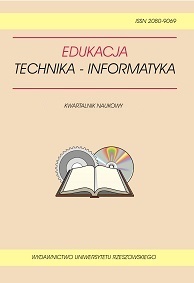Possibilities of utilization of the virtual environments in education
DOI:
https://doi.org/10.15584/eti.2016.2.34Keywords:
economic competitiveness, environmental sustainability, pedagogics approaches, knowledge-based economy, human capital, interpersonal skillsAbstract
The paper is devoted to understanding the influence of economic competitiveness and environmental sustainability on education. It was concluded that national economic competitiveness is linked to intellectual and capital and is driven by knowledge, and innovation. Sustainable development requires an understanding of the complexity of the global ecosystem and of creative problem-solving to find solutions to ‘wicked problems’ such as that of reconciling economic activity with a sustainable environment. It was highlighted the following overarching needs to: give a higher profile to the notion of interdependence: how closely one part of an ecosystem is linked to and depends upon another; making humanity more aware of its own fragility on this planet; highlight the role of cooperation: problems faced will only be resolved by international cooperation; develop the notion of a global public good: environmental sustainability can only be achieved by trans ceding particular national or individual needs.Downloads
Published
2016-06-30
How to Cite
TOLOCHKO, S., LYMAR, V., & RIDEI, N. (2016). Possibilities of utilization of the virtual environments in education. Journal of Education, Technology and Computer Science, 16(2), 258–263. https://doi.org/10.15584/eti.2016.2.34
Issue
Section
THE PROBLEMS ECOLOGICAL AND ENVIRONMENTAL EDUCATION
License
Copyright (c) 2016 Journal of Education, Technology and Computer Science

This work is licensed under a Creative Commons Attribution-ShareAlike 4.0 International License.

